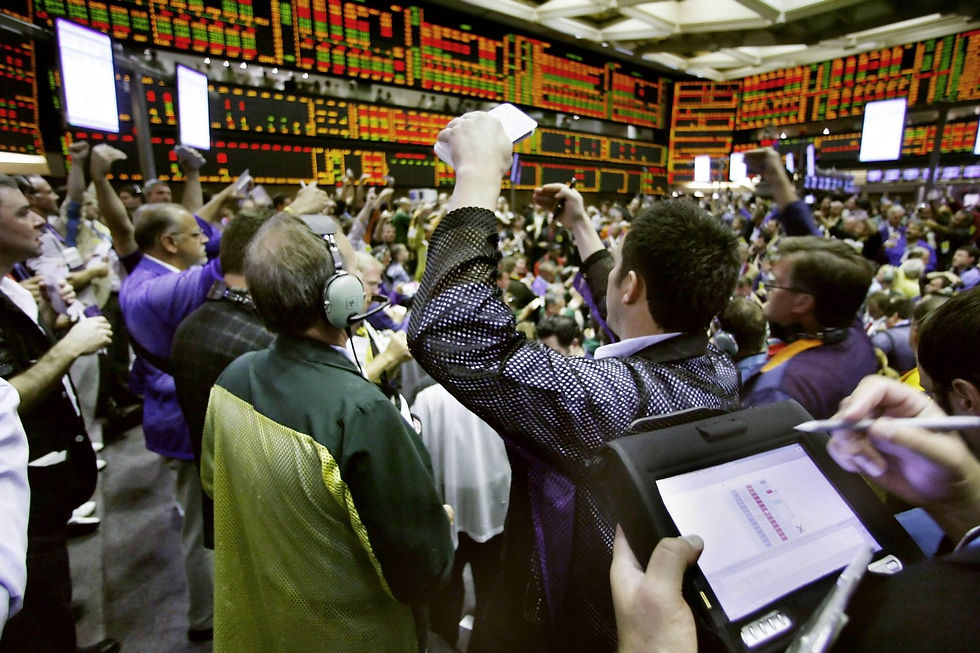Does the ‘Fantasy’ Economy Have Legs Beyond Sports?
- John Tamny
- Dec 4, 2020
- 4 min read
Updated: Oct 21, 2021
“In reality, all economic activity outside the stationary state is speculation” — Ludwig von Mises, Socialism, p. 181–182
By John Tamny is editor of RealClearMarkets

AP Photo/M Spencer Green
The upside-down world shaped by political panic over the virus perhaps unsurprisingly created winners and losers. Somewhat surprisingly given last March’s stock-market collapse in response to the rather sudden imposition of command-and-control, day trading was one of the winners. It was seemingly given life by the sick-inducing shuttering of so much that has long given life meaning.
A nation always transfixed by sports suddenly had to do without. What were fantasy sports fanatics to do? What were gamblers to do? One outlet for their restless minds turned out to be stock trading. The big unknown at this point is whether habits developed when politicians (and to be fair, many voters too) took a vacation from reality will maintain themselves once sanity returns. FantasyCommodities is a business concept that aims to provide clues.
But first, it’s useful to think about where the fantasy sports business is going. Over the last few decades it’s grown into a multi-billion-dollar business. Then came the aforementioned shutdowns. Despite the difficulties of the present defined by fewer games occurring in uncertain fashion, or games without fans, the big names such as FanDuel and DraftKings see a bright future. They’re not alone. Yahoo, ESPN, and CBS also plan to be major players, plus Facebook has indicated that it, too, intends to make its presence in the space known.
The creators of FantasyCommodities believe there’s potential beyond sports. In 2017, there were an estimated 60 million fantasy players in North America alone. This compares to approximately 20 million people who own stocks and bonds directly (not counting those who own investment funds which is more than half of the population).
FantasyCommodities games would involve forecasting changes in relative prices among commodities like oil, gasoline, aluminum and gold. Those who prove skillful will profit much as prescient fantasy sports fan do now. Better yet from a price discovery standpoint, a new market promises more information about the direction of commodities prices. Where it gets interesting is that commodity trading is in a sense ingrained in our DNA.
While fantasy sports is relatively new, people have been buying and selling commodity futures for millennia. No doubt organized exchanges only took root in the U.S. about 150 years ago, but even then we’re talking about a long history of commodity trading within the population.
Despite this, investing in commodity futures, and even commodity options, is expensive. It’s also very risky. FantasyCommodities games will only require small amounts of money with limited risk. The speculation is that more than a few fantasy sports contestants will be attracted to these new games, as well as many who already directly invest in stocks, bonds, or commodities. Low barriers to entry in this new fantasy market (care of low entry fees relative to traditional stock and commodity trading) make an impressive market possible in the U.S., and around the world.
“Around the world” is the operative term when it’s remembered that fantasy sports are limited to just a few countries where there are a sufficient number of sports leagues and teams to make it fun and viable. In contrast, commodity futures are traded worldwide by people from every country.
It’s also worth pointing out that fantasy commodity games, like fantasy sports, would be legal. Indeed, they would be games of skill rather than chance (commodities futures trading has always been legal). The founders of FantasyCommodities credibly argue they would be educational too.
Full disclosure, the founders explain my initial interest in the concept. While these columns have long argued that money would much more resemble money if currencies like the dollar, euro, yen and pound had commodity definitions, my interest in FantasyCommodities extends beyond an interest in currency-price stability.
Co-founder Richard Rahn is a longtime friend who was formerly chief economist of the U.S. Chamber of Commerce. Rahn was also part of a team that long ago developed the first workable petroleum futures contract for the New York Mercantile Exchange. Rahn is working with Al Gross. Gross’s background is in commodities trading, and includes the development of sophisticated fantasy commodity games. Bart Fisher is a well-known Washington, D.C. lawyer and economist who specializes in international trade, and then Patrick Hughes previously built an interactive sports management company that he subsequently sold to News Corp.
Beyond my enthusiasm for commodities as definers of money, along with my friendship with co-founder Rahn, my interest is in information. As the Mises quote that begins this piece makes plain, all economic activity is speculation. The latter is the source of crucial knowledge regardless of how the speculation does. The main thing is that economies progress based on information, and the success or failure of FantasyCommodities will help us to better understand if a multi-billion dollar industry has legs beyond sports.
John Tamny is editor of RealClearMarkets, Vice President at FreedomWorks, and a senior economic adviser to Toreador Research and Trading (www.trtadvisors.com). His next book, set for release in March of 2021, is titled When Politicians Panicked: The New Coronavirus, Expert Opinion, and a Tragic Lapse of Reason. Other books by Tamny include They’re Both Wrong: A Policy Guide for America’s Frustrated Independent Thinkers, The End of Work, about the exciting growth of jobs more and more of us love, Who Needs the Fed? and Popular Economics. He can be reached at jtamny@realclearmarkets.com.
This article was originally published by Real Clear Markets. https://www.realclearmarkets.com/articles/2020/12/03/does_the_fantasy_economy_have_legs_beyond_sports_651765.html




Comments